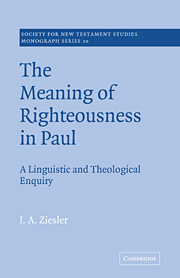Book contents
- Frontmatter
- Contents
- Preface
- Abbreviations
- Introduction
- 1 The Old Testament
- 2 Greek Usage of δíκαιος and cognates
- 3 Later Judaism I: the Septuagint
- 4 Later Judaism II: Intertestamental writings
- 5 Later Judaism III: Philo and Josephus
- 6 Later Judaism IV: The Rabbinic writings
- 7 The New Testament apart from the Pauline corpus
- 8 Paul: Philippians, Colossians, Thessalonians, Ephesians, the Pastorals, and Corinthians
- 9 Righteousness in Christ
- 10 Galatians
- 11 Romans
- Conclusion
- Appendix I Antonyms
- Appendix II The Apostolic Fathers
- Bibliography
- Index of passages cited
- Index of authors
4 - Later Judaism II: Intertestamental writings
Published online by Cambridge University Press: 04 August 2010
- Frontmatter
- Contents
- Preface
- Abbreviations
- Introduction
- 1 The Old Testament
- 2 Greek Usage of δíκαιος and cognates
- 3 Later Judaism I: the Septuagint
- 4 Later Judaism II: Intertestamental writings
- 5 Later Judaism III: Philo and Josephus
- 6 Later Judaism IV: The Rabbinic writings
- 7 The New Testament apart from the Pauline corpus
- 8 Paul: Philippians, Colossians, Thessalonians, Ephesians, the Pastorals, and Corinthians
- 9 Righteousness in Christ
- 10 Galatians
- 11 Romans
- Conclusion
- Appendix I Antonyms
- Appendix II The Apostolic Fathers
- Bibliography
- Index of passages cited
- Index of authors
Summary
There are several ways in which these could be classified. One is in terms of Palestinian and Alexandrian (or Hellenistic) origin, and some account of this must indeed be taken, but the dividing lines are not clear enough to be useful. There is probably no book without some debt to both Palestine and Hellas, whether acknowledged or not. Another method could be in terms of date, but this is sometimes quite uncertain, though most are probably pre-Pauline and all are early enough to be admissible evidence for usage of words. The method appropriate to this enquiry seems to be classifying by language, i.e. Hebrew, Greek, and Hebrew and Greek together. No account has been taken, in the vocabulary analysis, of books surviving only in languages other than Hebrew or Greek, though their teaching has been considered in the appropriate section. There is only one book whose Hebrew and Greek texts are both sufficiently well established for a useful examination of their relation to be made, and that is Sirach. However, because of the surprising lack of overlap of our two word-groups in Sirach, the cases of δικαι- have also been included in the analysis of Greek books. It will be evident that the categories are not the same in every case as those used for the OT. This was not planned, but is how the pattern fell out, which may in itself be important.
GREEK AND HEBREW: SIRAGH
δικαιóω
Of 11 cases, only 3 render tsādaq. Five have no Hebrew equivalent, because that part of the Hebrew text is lacking: Sir. 1.22; 18.2, 22523.11; 26.29.
- Type
- Chapter
- Information
- The Meaning of Righteousness in PaulA Linguistic and Theological Enquiry, pp. 70 - 104Publisher: Cambridge University PressPrint publication year: 1972



